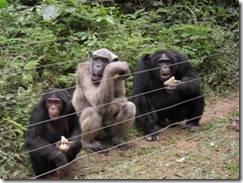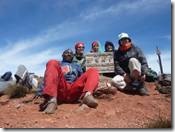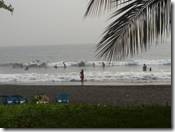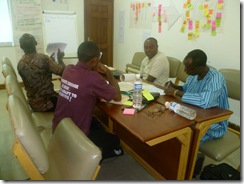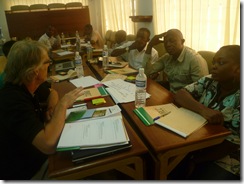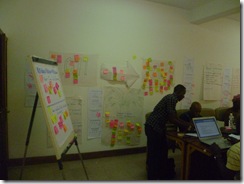Since my previous employer granted me an extra two weeks leave, I took the opportunity to see a bit more of the North, which now I am based in Ibadan, ten hours South of Abuja, is much more difficult.
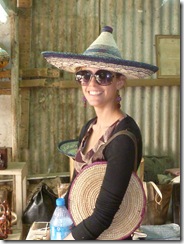 |
| Heather and a hat |
I started by travelling to Kaduna, where I spent a few days with Heather, fortunately as I was leaving my house a fellow volunteer warned me that it was cold in Kaduna, and I grabbed a fleece. Wow was I pleased, I was sleeping in it, and wearing it on motorbikes, it was cold, according to the BBC website reaching 13°C at night. The reason it was so cold was because it was Harmattan, the name given for the season where sand blows south from the Sahara blocking out the warmth of the sun, it creates a hazy impression, see photo below, and a lot of dry skin, cracked feet, cracked lips, coughs sneezes and so on.
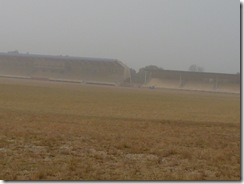 |
| Sports ground in Harmattan dust |
Anyway in Kaduna, rat no 1, made an appearance, it didn’t alarm me too much as when I saw it it was stationery, so it didn’t make me jump. Zippy the cat didn’t take too much notice either!
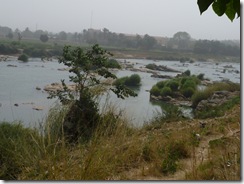 |
| The view of the river from Sea Breeze |
Heather’s local bar is called Sea Breeze, it must be at least 500km from the sea, but it does have a view of the river. Two other volunteers live close by just along Rat Alley, named due to the proliferation of rubbish and therefore rats. The river also floods in the rainy season, Heather had to move out in August because her road flooded, and no doubt the swamps that are left create a great breeding ground for malaria, which Heather has managed to contract six times in her 12 months in Nigeria. It is now my third year in a malaria zone, and so far I am unaffected, lucky me!
Dutse – rat no 2 and many ants
My next stop was in Dutse, the state capital of Jigawa state, where I visited Lucy, a British volunteer from Bournemouth and Lawrence a Ugandan. Jigawa state is very different from any other part of Nigeria I have seen, it was much hotter, and felt much quieter and more rural. Dutse the capital only has a population of 17,000 according to Wikipedia.
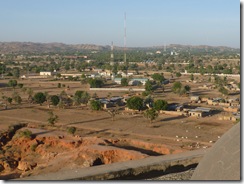 |
| View from The Tower |
It’s a challenging place to live, especially for a woman, you hardly see any women anywhere, and when you do they are well covered. Lucy really misses female company. It also got me thinking about whether religion is a choice or not, Lucy works at ESSPIN, Education State Sector Support Programme in Nigeria, which is UK funded. Although there are only around 10 staff a mosque is provided in the building, so I imagine if you are a Muslim man, the pressure to go to the mosque at the appropriate time, and to fast during Ramadam, is pretty high.
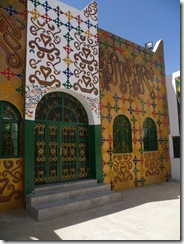 |
| Emir's Palace |
Lucy and Lawrence have some consolations though, a wonderful house, inside and out. Ensuite bathrooms, and the most amazing garden, and a mosque just outside, should they feel the need. There were a few disadvantages, here I saw rat no 2, boldly in broad daylight helping itself to the rubbish bin, at least this time it was in the garden not in the house, along with several thousand ants in Lucy’s bathroom, and the neighbouring mosque calling you to pray five times a day!
 |
| Lawrence in the secret garden |
Dutse – means rocks and is surrounded by these rather beautiful rocks.
 |
It wasn’t all relaxation while I was there, Lucy got me making resources for her Sangaya classes, she is training teachers to train the Almajiri boys. These boys are sent to be trained in the Quran, Lucy’s organisation is making sure they get at least some basic skills in English, Maths, Hausa (the local language) and Social Skills. You can read more at her blog here.
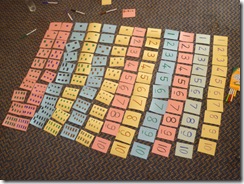 |
| My hard work, hopefully now being used to teach Nigerian children |
Kano – rat no 3 – fortunately a no show.
My next stop was at Kano, where I have been several times before, but I really wanted to go to Kurmi Market, (last time I went it was Friday afternoon, during an Islamic holiday everything was closed). The market is ancient, allegedly has been there for thousands of years, and traded slaves, now it is famous for all sorts of crafts, I bought a leather bag, it also sells blankets, and the traditional “dresses” for camels and horses.
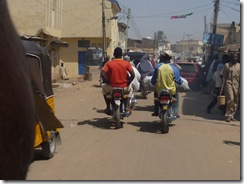 |
| Kano street view from the back of a bike |
I got a lift to the market from Jusuf who works at the Dye Pits, on the way back he took me on the back of his bike down alley ways to see the tannery, crocodile and snakes skins were there along with goat. I even went to the museum, what a lot of culture!
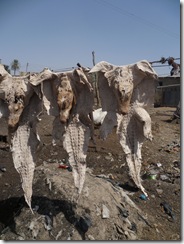 |
| Crocs! |
I stayed with Abbe, a Ugandan volunteer and Beth, unfortunately Beth wasn’t there, she is in the UK on sick leave. Much to my relief I didn’t get to see their resident rat, which apparently is as big as a yam!
Zaria – no rats
I stopped in Zaria on my journey South from Kano, to take a look at the Emir’s Palace. I also learnt about the Queen of Zaria, who was a great warrior, and never married, but had a series of “temporary” husbands who were killed in the morning so that they didn’t tell tales.
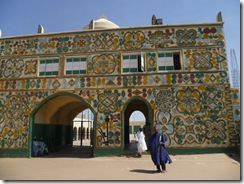 |
| Emir's Palace Zaria |
I also visited Miriam, a Dutch volunteer at her workpace, which is a rehab unit for sufferers of HIV TB and leprosy, and is set in amazing scenery.
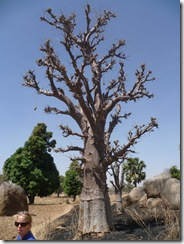 |
| Miriam and a tree |
Kagoro – rat no 4
My next stop was to visit Kim in Kagoro. I have been hearing how beautiful Kagoro is since I arrived in Nigeria, and how it has a mountain. So I was hoping to climb the mountain, unfortunately I didn’t get time, so it is still “calling” me!
Kagoro is a very small village, and probably the most rural place I have been in Nigeria, it was very quiet, mainly due to the lack of electricity, no microphones, music, calls to prayer, loud churches, cars “horning” there were of course cockerels and a rat.
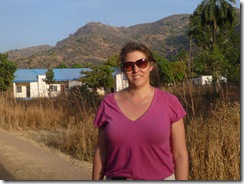 |
| Me and a mountain |
Rat no 4, made its appearance when Kim and I were sitting chatting to the light of a paraffin lamp. We heard a pitter patter of running around the room, and yes it was a rat which we managed to chase around the house, but not to get rid of. It was definitely smaller than rats no 1 and 2, however Kim’s squeals definitely won the award.
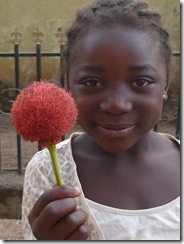 |
We did go for a nice walk on Friday evening, but I didn’t get to climb the mountain as I left to go to Panyam on Saturday morning.
Panyam – no rats
My next trip was to Panyam, and I nearly didn’t make it, due to trouble in Jos. To travel between Kagoro and Panyam, I had the option of an eight hour journey changing several times or a two / three hour journey via Maraba-Jamaa. The question was how far is Maraba-Jamaa from Jos?
The reason for the question is that every since I have been in Nigeria VSO volunteers are banned from travelling to Jos, or within 10km of Jos. Anyway after much research, deciding Maraba-Jamaa was more than 10km from Jos, talking to local people etc I decided to make the journey.
The reason I am mentioning it here, is because the journey was fine, the scenery beautiful and if I hadn’t seen a number of military road blocks along the way and known that very recently there had been local killings (and more since) I would never have known. This got me thinking about how easily we distance ourselves from conflict, because we can’t take any more, or don’t know what to do about it, or because it is easier not to care. Anyway on a lighter note…
 |
| Dan and Stella in Panyam |
I spent the weekend with Daniel, Stella and Joel, Kenyan volunteers and Mike, Canadian, relaxing, playing scrabble and cooking chapatis and of course eating them!
On my return to Abuja, again via Maraba-Jamaa, more military road blocks, no conflict, but we lost a wheel on the vehicle, see previous blog, perhaps another reality check, I am sure the number of deaths in Nigeria in road accidents greatly outweighs those from any kind of conflict, and is probably more easily prevented, wheel nuts for instance!
More photos


